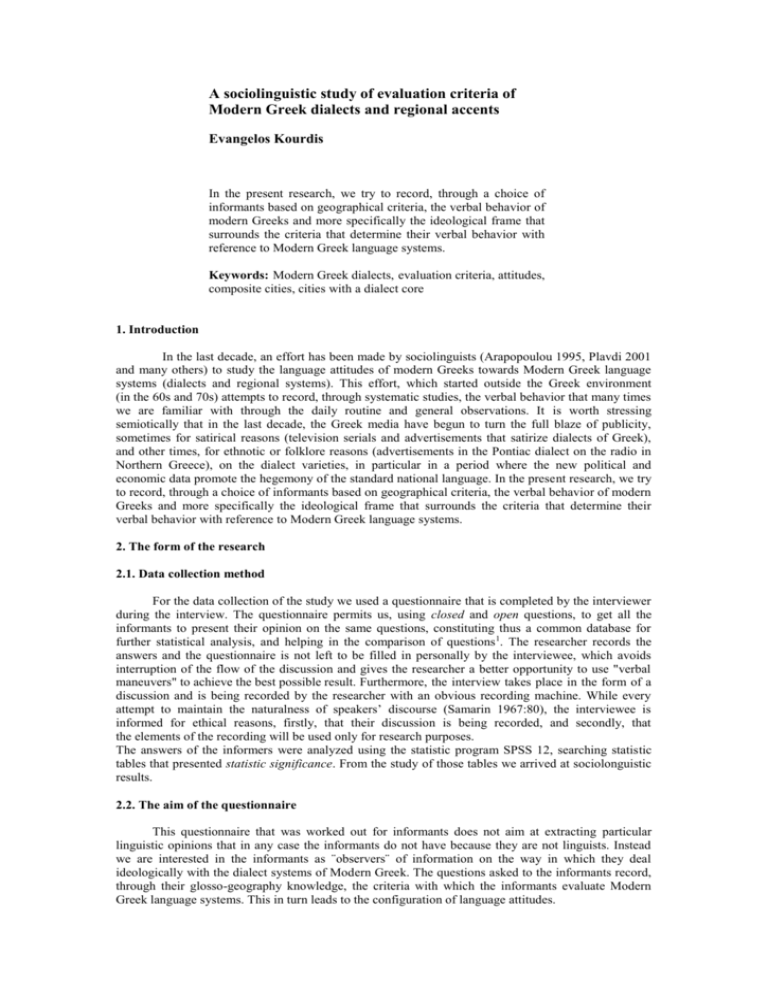A sociolinguistic study of evaluation criteria of Modern Greek
advertisement

A sociolinguistic study of evaluation criteria of Modern Greek dialects and regional accents Evangelos Kourdis In the present research, we try to record, through a choice of informants based on geographical criteria, the verbal behavior of modern Greeks and more specifically the ideological frame that surrounds the criteria that determine their verbal behavior with reference to Modern Greek language systems. Keywords: Modern Greek dialects, evaluation criteria, attitudes, composite cities, cities with a dialect core 1. Introduction In the last decade, an effort has been made by sociolinguists (Arapopoulou 1995, Plavdi 2001 and many others) to study the language attitudes of modern Greeks towards Modern Greek language systems (dialects and regional systems). This effort, which started outside the Greek environment (in the 60s and 70s) attempts to record, through systematic studies, the verbal behavior that many times we are familiar with through the daily routine and general observations. It is worth stressing semiotically that in the last decade, the Greek media have begun to turn the full blaze of publicity, sometimes for satirical reasons (television serials and advertisements that satirize dialects of Greek), and other times, for ethnotic or folklore reasons (advertisements in the Pontiac dialect on the radio in Northern Greece), on the dialect varieties, in particular in a period where the new political and economic data promote the hegemony of the standard national language. In the present research, we try to record, through a choice of informants based on geographical criteria, the verbal behavior of modern Greeks and more specifically the ideological frame that surrounds the criteria that determine their verbal behavior with reference to Modern Greek language systems. 2. The form of the research 2.1. Data collection method For the data collection of the study we used a questionnaire that is completed by the interviewer during the interview. The questionnaire permits us, using closed and open questions, to get all the informants to present their opinion on the same questions, constituting thus a common database for further statistical analysis, and helping in the comparison of questions1. The researcher records the answers and the questionnaire is not left to be filled in personally by the interviewee, which avoids interruption of the flow of the discussion and gives the researcher a better opportunity to use "verbal maneuvers" to achieve the best possible result. Furthermore, the interview takes place in the form of a discussion and is being recorded by the researcher with an obvious recording machine. While every attempt to maintain the naturalness of speakers’ discourse (Samarin 1967:80), the interviewee is informed for ethical reasons, firstly, that their discussion is being recorded, and secondly, that the elements of the recording will be used only for research purposes. The answers of the informers were analyzed using the statistic program SPSS 12, searching statistic tables that presented statistic significance. From the study of those tables we arrived at sociolonguistic results. 2.2. The aim of the questionnaire This questionnaire that was worked out for informants does not aim at extracting particular linguistic opinions that in any case the informants do not have because they are not linguists. Instead we are interested in the informants as ¨observers¨ of information on the way in which they deal ideologically with the dialect systems of Modern Greek. The questions asked to the informants record, through their glosso-geography knowledge, the criteria with which the informants evaluate Modern Greek language systems. This in turn leads to the configuration of language attitudes. 2.3. Criteria for selection of informants The research occurred in the first semester of 2004. The following qualitative and quantitative characteristics led to the selection of informants (Filias 1993:294): a) Sex: We selected 96 individuals, 48 men and 48 women, which is a sample size that can be considered representative (Sankoff 1974:22). b) Place of origin: The informants come from the regions of Thessalonica, Larissa, Athens and Patras. The informants that were selected are natives or have resided in their region for at least the past 5 years, a period that helps in their integration into the urban way of life and its variety of stimuli. The regions that were selected constitute an imaginary line that covers the more important urban centers of continental Greece and represent a particularly vast number of Greeks. More specifically, Athens and Thessalonica were selected as composite cities, where dialects have disappeared or been replaced by the standard or a variety of the standard. On the contrary, Larissa and Patras were selected as cities with a dialect core that is supplied demographically by the also dialect speech suburban interior part (Τzitzilis 2000: 88, Papazahariou 2004:1). c) Age: The speakers were separated into two age groups. The first includes people from 20 to 40 years old, and the second, people from 40 years old and over. We believe that speakers under 20 years have not shaped an opinion of the Modern Greek language systems, so they were excluded. d) Education level: The informants constituting our sample are primary, secondary and tertiary education graduates. In choosing the sample, we attempted to correlate the education level of the informants with their social class (working, upper-middle and upper class respectively). 3. Criteria for evaluation of Modern Greek language systems From the research that we conducted, we realized that the criteria with which informants evaluate the Modern Greek language systems have to do with the aesthetics of the language system (47,9%), with its comprehension by all Greeks (17,8%), with the history and the tradition with which it is connected (8,3%), with how “brogue" (strong) these language systems are (7,3%), with the origin of the informants themselves which influences the evaluation sentimentally (6,3%), with the purism of the language system from foreign loans (5,2%) and with the sentiment associated with the contact that they had with the language system (1,0%). A small percentage of the informants (4,2%) declare that they do not have any criteria with which to approach it. The criterion of comprehension of language systems by all Greeks constitutes the second more important criterion, after the criterion of aesthetics. It is expressed in different ways (comprehensible dialect, "heavy" dialect or accent, no "proper"/standard Greek language), but it is categorized in the criterion of divergence from the standard language (Modern Greek). 3.1. Results of research with statistical significance Based on this research, we realized the significance only in the case of correlation of the informant’s sex with the criteria for evaluation of Modern Greek dialects and regional accents. Indeed, in this case (table 1), we can see that of the informants who answered that their attitude towards a Modern Greek dialect or accent is influenced by the aesthetics of the language system, that is to say, how pleasant the dialects or accents sounds to them, women are in the majority (60,9%). In contrast, men (58,8%) outnumber women among informants who approach the language systems on the basis of how comprehensible it is. Moreover, only the men reported other factors that can influence their attitudes towards the language systems, such as the "purism" of the dialect system, its divergence from the standard language, and the contact that they had with it. We observe, in other words, that the women are influenced more in their attitude by aesthetic factors, such as the aesthetics of the system, while the men present themselves as more practical and analytical in their approach. It is known from social practices that women are interested more than men in the expression of aesthetics in all forms of human activity. Similar attitudes were reported for women in previous research, where it appeared that the insular and, in general, not the continental systems, are considered by women to sound more pleasant and are evaluated more highly and more positively than the rest of the language systems of the Hellenic area (Kourdis, 2003:186). SEX CRITERIA Aesthetics of the dialects or regional accents Comprehension of the dialects or regional accents “Brogue” (strong) dialects or regional accents Origin of the informant Men Women Total 39,1% 18 37,5% 58,9% 10 20,8% 57,1% 4 8,3% 50,0% 3 6,3% 60,9% 28 58,3% 41,1% 7 16,7% 42,9% 3 6,3% 50,0% 3 6,3% 100,0% 1 2,1% 50,0% 4 8,3% 100,0% 46 47,9% 100,0% 17 17,8% 100,0% 7 7,3% 100,0% 6 6,3% 100,0% 1 1,0% 100,0% 8 8,3% 100,0% 5 5,2% 100,0% 1 1,0% 100,0% 1 1,0% 100,0% 4 4,2% 100,0% 96 100,0% Sentimental reasons History, tradition Language purism Divergence from the Modern Greek Contact with the dialects or regional accents Do not Know Total 50,0% 4 8,3% 100,0% 5 10,4% 100,0% 1 2,1% 100,0% 1 2,1% 50,0% 2 4,2% 50,0% 48 100,0% 50,0% 2 4,2% 50,0% 48 100,0% Table 1: correlation of the informant’s sex with the criteria for evaluation of Modern Greek linguistic systems 3.2. Results of research without statistical significance Apart from the results with statistical significance, some results without statistical significance should also be reported, as these have some importance since they record the tendency that exists in our statistical sample of informants. Thus, we observe that informants in the younger age group of 20-40 years are slightly more sensitive to the criterion of aesthetics of Modern Greek dialects and regional accents: pleasant sounding language system (52,2%), "brogue"(strong) language system (71,4%). On the other hand, the older age group, the group of 40 years old and over, are more favorable towards the criterion of origin (66,7%) and tradition (62,2%). More generally, we would say that the approach of the younger age group is more surface, more romantic, while the older age group is more sentimental and based on experience. Approaching the criteria of evaluation by the education level of the informants, we can see that informants who have received primary education give more attention to the criterion of comprehension of Modern Greek language systems and their successful communication with the dialect speakers (47,0%) compared to the informants who have received secondary education (29,4%) and tertiary education (23,6%). It is also very interesting that special attention is paid to the criterion of history and tradition by informants of tertiary education (62,5%); even if we weighed the data for that, these informants would have for this criterion a more sentimental and scientific approach. Also of interest is the geographical distribution of criteria for evaluating the Modern Greek dialects and regional accents. Thus, informants from Athens (32,6%) and Larissa (32,6%) outnumber others by far in the criterion of aesthetics of Modern Greek varieties compared with those from Patras (19,6%) and Thessalonica (15,2%). That is to say, the criterion of aesthetics is least important at the two poles of the imaginary line that divides Greece and which supported the geographical choice of our sample, while it is more powerful in the center of the line. At the same time, the subject of comprehensibility and successful communication is slightly more important for Athens, which belongs to the composite cities, and Patras, which belongs to the cities with a dialect speech core. It is, however, these regions that are geographically more distant from the regions of Central and Northern Greece, Larissa and Thessalonica, where the northern group of dialects dominate. This, we believe, is the reason why for informants that focused on the criterion of purism, 60,0% is from Larissa, 20,0% from Thessalonica, 20,0% from Athens and none from Patras. 4. Remarks When Giles (1970) asked English informants to approach and evaluate the dialect varieties in the English territory he took into consideration three dimensions: a) the aesthetics of the dialect, that is to say how pleasant or unpleasant informants find the language, b) the social status of the dialect, that is to say, how much social prestige attaches to the linguistic system, and c) the communicative dimension, that is to say, how comfortable informants feel when they come in contact with the variety (psychological criterion). Trudgill (1983:216), when researching the Cretan dialect and the Modern Greek (Athenian) with English informants, gave once again a triple dimension in the criteria of approach and evaluation of Greek language systems with the difference that he replaced the criterion of communicative dimension with the criterion of "refined" language system. In the present research, we realize that our informants not only covered the previously mentioned criteria, but also pointed out others, namely the origin of the informants themselves, the history and the tradition with which the dialect or regional accent is interwoven, its purism, the personal contact that they have had with it and the divergence that they perceive from the standard language. Despite the variety, however, for almost half of the informants, the criterion of aesthetics constitutes the most important of all, with the women and youngest in age more positively oriented towards this criterion. It should be marked, also, that the Greek informants, contrary to the English, reported this criterion exclusively in terms of pleasant sounding (melodious dialects). That is to say, the criterion of aesthetics of dialects is classified by its pleasant acoustics, while its unpleasant acoustics constitute a separate criterion and is reported as a "heavy" 2 dialect or regional accent. It is also impressive that the informants do not refer to the criterion of geographical region, that is to say, they do not evaluate the dialect systems with the basis of the regions where they are used3. Also, differences are not reported in the criterion for the written and oral forms, if, that is, the dialect systems have written tradition. Consequently, we cannot speak for a scientific or philological type of evaluation of Modern Greek dialects and regional accents, but more for their sentimentalexperience and communication difficulty for modern Greeks. This last criterion is stressed particularly by the South Greek pole of our research (Athens, Patras), which implies that the characteristic of difficult reciprocal communication with the residents of Southern Greece is still charged to the Northern Greek dialects. Notes 1. See Filias (1993:129). It is of course for places that are disputed by Briggs (1987). 2. For the "heavy accent", Samarin and Kalmar (1979:184) report three gradations in the accent: strong, medium and light. Other researchers, such as Urciuoli (1998:123-125) discuss heavy coloration (accent), and because this term has prevailed also the daily practice of Greek provinces (Plavdi 2001:624) it was also adopted in the present research. With the term heavy "accent" in the study we refer to the first gradation of Samarin and Kalmar. 3. On the contrary, the geographic determinations dominate in the question "what is proper Greek language" where the language of Athens is stressed particularly. References Arapopoulou, Μaria. 1995. Attitudes towards the Greek Language and its speakers. Post-Degree Dissertation, Department of Philology, Aristotle University of Thessalonica Briggs, Charles. 1986. Learning how to ask: A sociolinguistic appraisal of the role of the interview in social science research. Cambridge University Press Giles, Hiles. 1970. “Evaluative reactions to accents”. Educational Review (22), 211-227 Κourdis, Evangelos. 2003. Thessalian Dialect: Language and Ideology. Unpublished Ph.D. diss., Aristotle University of Thessalonica Papazahariou, Dimitris. 2004. “Realizations of the phonological lateral unit /l/ in the regional variety of Patras”. Paper presented at the 6th International Congress of Greek Linguistics, University of Crete, Department of Philology, Rethymon 18-21 September 2003, published in http://www.philology.uoc.gr/conferences/6thICGL/gr.htm Plavdi, Μaria. 2001. “Language attitudes and dialect shift”. Studies of the Greek Language. Proceedings of the 21ης Annual Meeting of Section of Linguistics, Department of Philology, Aristotle University of Thessalonica, 12-14 May 2000, Thessalonica, 618-629 Samarin, Williams. 1967. Field linguistics a guide to linguistic field work. New York: Rinehart & Winston Samarin, Williams & Kalmar, Ivan. 1979. “Reactions to foreign accent”. Sociolinguistics studies in language contact, Mackey, W. & Ornstein, J. (eds), The Hague-Paris-New York: Mouton Publishers, 181-196 Sankoff, Gillian. 1974. “A quantitative paradigm for the study of communicative competence”. Explorations in the Ethnography of Speaking, Bauman, R. & Sherzer, J., eds., London: Cambridge University Press, 18-49 Τzitzilis, Christos. 2000. “Greek Dialects and Modern Greek Dialectology”. The Greek Language and its dialects, Christidis, A., ed., Athens: Directorate of National Education and Religious Affairs & Center for the Greek Language, 15-22 Τrudgill, Peter. 1983. On dialect: Social and geographical perspectives. Oxford: Basil Blackwell Filias, Vassilios. 1993. Introduction to the methodology and the techniques of social research. Athens: Gutenberg Urciuoli, Bonnie. 1998. Exposing prejudice: Puerto Rican experiences of language, race and class. Boulder, Colorado: Westview Press Περίληψη Η παρούσα έρευνα αποτελεί μια κοινωνιογλωσσολογική μελέτη των κριτηρίων με τα οποία οι σύγχρονοι Έλληνες προσεγγίζουν και αξιολογούν τις σύγχρονες νεοελληνικές διαλέκτους και τα ιδιώματα. Μέσα από μια επιλογή πληροφορητών με βάση γεωγραφικά και κοινωνιολογικά κριτήρια, γίνεται μια προσπάθεια καταγραφής της γλωσσικής τους συμπεριφοράς στοχεύοντας στην ερμηνεία των αξιολογικών τους στάσεων απέναντι στη γλωσσική ποικιλία.








